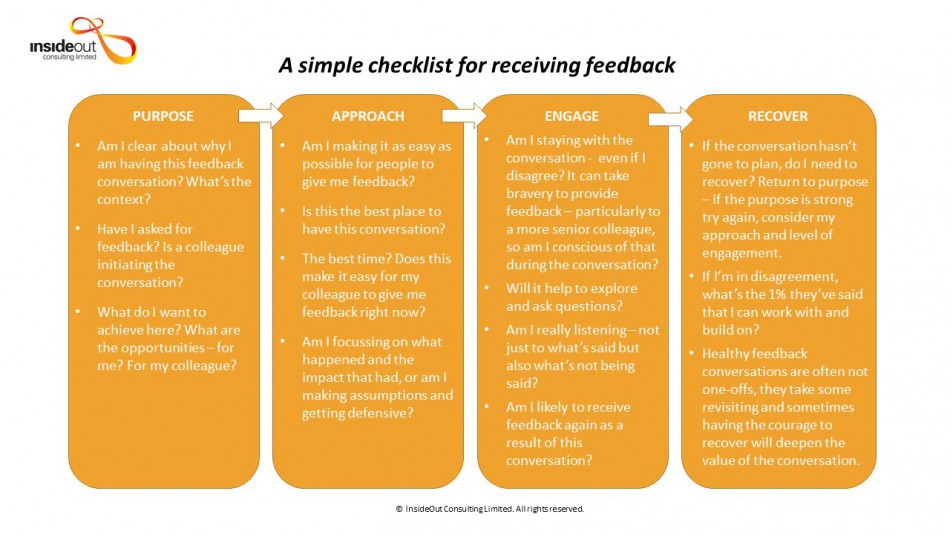What we’re thinking

It’s important to receive as well as give
Feedback, like giving and receiving gifts, can bring delight and disappointment! Some gifts have clearly been given plenty of thought. Then there are the last minute gifts – the ones people give us because they feel they should, the ones they’ve clearly found in the ‘present draw’, the last minute “petrol station bunch of flowers” type gift. These gifts might be less well received (even though we smile and say thank you!). Maybe we’re given ‘over the top gifts’ – ones which take us by surprise – they may embarrass us or we may be thrilled. Maybe we don’t receive many gifts at all.
Receiving gifts isn’t always easy. Just like feedback.
Take a look at your inbox. If it’s anything like mine then there are plenty of requests for feedback in it – right now I’ve got requests to give packaging feedback to Amazon, hotel feedback to booking.com, and customer service feedback to Apple. Yesterday I had to decide whether or not to give feedback to my BT Customer Service Agent before we even started the call! Then I’ve got My Fitness Pal app giving me feedback on how many calories I’ve just consumed and how many steps I’ve taken so far today. And in the office I need to complete the employee opinion survey, provide feedback to my manager ahead of her performance review, and give feedback to the project team on their recent activities. Ring any bells….?!
In our experience, working inside organisations and also as consultants and coaches, there has been an increasing emphasis in recent years on giving feedback to each other. But less on the challenge of receiving feedback.
In recent work with 300+ people I asked how many of them had given valuable feedback within the last month. About half. And how many had received valuable feedback in the same timescale? Less than a quarter. Interesting.
How do we receive the various kinds of feedback, especially when we consider it to be the “petrol station flowers” type gift of feedback? How do we ensure we get constructive, valuable information? Then, how do we digest and decide whether or not to make any changes as a result? The more senior we get the harder we need to work to ensure we are turning the giving and receiving of feedback from a tick-box exercise into a valuable, sustainable, helpful opportunity. It requires listening, asking questions, and exploring perspectives. It requires thought from both sides. It requires a conversation.
Senior leaders often struggle to get valuable feedback – sometimes because colleagues are unwilling to challenge, or praise ‘upwards.’ And the way feedback is received sends a clear message – ‘I’m ready to listen and I mean it. Even if your opinion is different to mine.’ Or, ‘I’ve asked for feedback, but I don’t really mean it if you’re giving me the ‘wrong’ answer!’ ‘I haven’t got time for a conversation about it.’
But how else do we know the impact we are having through our work, particularly on our colleagues and customers, if we don’t get any feedback? Whilst our organisations can introduce processes and technology intended to help us receive valuable feedback, ultimately it’s down to us as individuals to create an environment around us that gives us and others the feedback to motivate, inspire, challenge and support performance.
Having a deeper self-awareness of our impact on others requires us to receive feedback in way that keeps it coming and is useful. But it’s often easier said than done! Maybe we’re inclined to ignore the ‘good stuff.’ Maybe we switch off when we disagree. Or get irritated if it’s not clear. Maybe we ask for feedback but don’t really listen to the responses. Maybe we’re just too busy and it becomes a ‘nice to have.’
It got me thinking. How am I at receiving feedback? Particularly if that feedback is challenging, perhaps over the top or lacking construction? Maybe it is well-intended but catches me by surprise or isn’t particularly clear. Do I focus my efforts on really trying to understand? Or, do I move into defensive mode and try to make my points? When I ask for feedback, do I make it easy for people to give? And do I have a conversation about it that will result in more feedback down the line? Or is that the last time my colleague is likely to provide me with anything useful?!
So here’s your feedback challenge. Consider these questions over the next week to help you make the most of feedback opportunities:

“No matter how good you think you are as a leader, my goodness, the people around you will have all kinds of ideas for how you can get better. So for me, the most fundamental thing about leadership is to have the humility to continue to get feedback and to try to get better – because your job is to try to help everybody else get better.” – Jim Yong Kim, President of the World Bank.
This blog is part of a set we are writing in collaboration with our friends at Four Points Consulting. Check out the Four Points Resource Centre for a stack of useful free tools, techniques and frameworks to support business improvement.

Andrew Bidnell is a professional certified coach and an experienced consultant who founded InsideOut Consulting in 2006. The focus is on leadership and communication and, in particular, the challenge of engagement – of self and of others – to achieve maximum impact and fulfillment. He has worked internationally with 1,000+ leaders in the public, private and not-for-profit sectors, always seeking to facilitate, challenge, support and unlock potential that lies inside an individual, a community, an organisation, and bring that strength, passion and knowledge out for maximum impact.